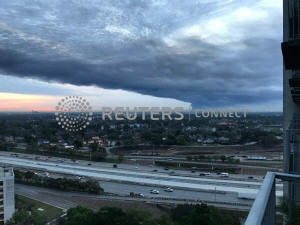|
Houston petrochemical fire put out after
it re-ignites, had added to shipping woes
 Send a link to a friend
Send a link to a friend
 [March 23, 2019]
By Gary McWilliams [March 23, 2019]
By Gary McWilliams
HOUSTON (Reuters) - A petrochemical fire
was quickly put out after it had re-ignited Friday at a fuel storage
facility outside Houston, which had compounded the danger from a
containment wall breach earlier in the day that spilled chemicals and
halted ship traffic in the nation's busiest oil port.
The fire in multiple giant tanks of fuel at Mitsui & Co.'s
Intercontinental Terminals facility in Deer Park, Texas, was put out by
emergency workers at the scene about an hour after it began. But
lingering smoke and leaking toxic chemicals prompted the U.S. Coast
Guard to halt vessel traffic from the ITC site near Tucker Bayou to
Crystal Bay, near the mouth of the channel.
Police also halted traffic on a busy highway for a time amid the smoke
and air pollution worries. Hundreds of people showed up Friday to be
checked at a medical clinic in Deer Park after air monitors a day
earlier showed a spike in benzene, a cancer-causing chemical contained
in the tanks of gasoline.
Friday's fire erupted on the West side of the facility and engulfed
several of the 11 tanks damaged earlier in the week. The tanks contained
fuels used to make gasoline and plastics. Each can hold up to 3.3
million gallons.

CONTAINMENT WALL COLLAPSE
There were no worker injuries reported on Friday, a spokesman for
Intercontinental Terminals said.
There were about 100 workers at the site on Friday, pumping chemicals
from damaged tanks and trying to close a breach in the six-foot-tall
containment wall surrounding the site. A portion of the wall suffered a
collapse earlier in the day.
The chemicals leak prompted the facility to call for a shelter-in-place
order for the local area for the third time this week. ITC said
emergency workers set up booms to halt the spread of the chemicals
spilling from the site.
The spill led the U.S. Coast Guard to halt ship traffic along most of
the Houston Ship Channel, creating a bottleneck of vessels looking to
enter or leave terminals on a key industrial waterway that connects
Houston to the Gulf of Mexico.
Movement was initially halted on a five-mile stretch between Tucker
Bayou and Ship Channel light 116, said Coast Guard Vessel Tracking
Service Watch Supervisor Derby Flory, and later expanded.
[to top of second column]
|

Smoke covers the Houston area from a fire burning at the
Intercontinental Terminals Company in Deer Park, east of Houston,
Texas, U.S., March 18, 2019. Michael Sahrman/Handout via REUTERS

The breach occurred as emergency workers were pumping pyrolysis
gasoline from one of the 11 tanks destroyed or damaged during a fire
that started Sunday and took more than three days to extinguish.
Fumes from the exposed fuels triggered elevated benzene readings on
Thursday at an air monitor located near the site. The company said
the benzene likely came when the fuels were exposed to the air.
The Texas Commission on Environmental Quality said containment booms
were placed in waterways to halt flows into the Ship Channel. The
Coast Guard was skimming and pumping contaminated runoff into
storage containers, the regulator said.
ITC and emergency officials were working on a plan to stop the flow
of chemicals, water and foam into surrounding areas when the fire
erupted, ITC spokesman Dale Samuelsen said.
Samuelsen could not say how much chemicals and water were leaking
from the breach. The barrier held back water, chemicals and foam
from an area where firefighters poured up to 20,000 gallons (75,700
liters) of water and foam a minute during the three-day blaze that
destroyed the huge tanks.
(Reporting by Gary McWilliams and Collin Eaton; editing by
Marguerita Choy and James Dalgleish)
[© 2019 Thomson Reuters. All rights
reserved.]
Copyright 2019 Reuters. All rights reserved. This material may not be published,
broadcast, rewritten or redistributed.
Thompson Reuters is solely responsible for this content.
 |